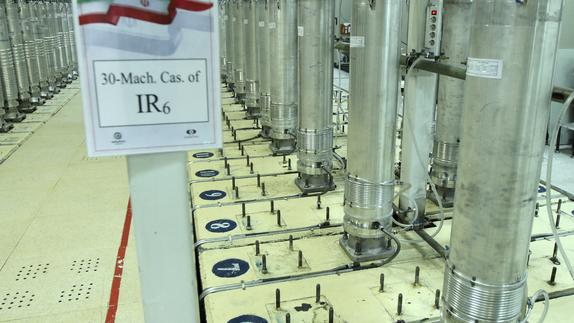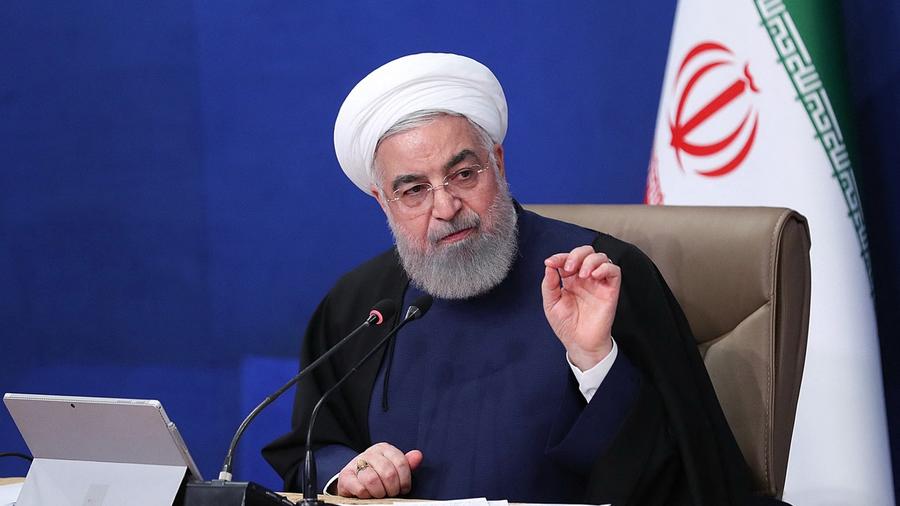 This file photo released Nov 5, 2019, by the Atomic Energy Organization of Iran (AEOI), shows centrifuge machines in the Natanz uranium enrichment facility in central Iran. The facility lost power on April 11, 2021, just hours after starting up new advanced centrifuges capable of enriching uranium faster, the latest incident to strike the site amid negotiations over the tattered atomic accord with world powers. Iran on Sunday described the blackout an act of “nuclear terrorism,” raising regional tensions. (ATOMIC ENERGY ORGANIZATION OF IRAN VIA AP, FILE)
This file photo released Nov 5, 2019, by the Atomic Energy Organization of Iran (AEOI), shows centrifuge machines in the Natanz uranium enrichment facility in central Iran. The facility lost power on April 11, 2021, just hours after starting up new advanced centrifuges capable of enriching uranium faster, the latest incident to strike the site amid negotiations over the tattered atomic accord with world powers. Iran on Sunday described the blackout an act of “nuclear terrorism,” raising regional tensions. (ATOMIC ENERGY ORGANIZATION OF IRAN VIA AP, FILE)
TEHRAN/PARIS - The European countries party to the Iran nuclear deal told Tehran on Wednesday its decision to enrich uranium at 60 percent purity, bringing the fissile material closer to bomb-grade, was contrary to efforts to revive the 2015 accord.
But in an apparent signal to Iran’s arch-adversary Israel, which Tehran blamed for an explosion at its key nuclear site on Sunday, European powers Germany, France and Britain added that they rejected “all escalatory measures by any actor”.
Iran’s dangerous recent communication is contrary to the constructive spirit and good faith of these discussions (in Vienna).
Joint statement from Germany, France and Britain
READ MORE: Iran says began 60% uranium enrichment after Natanz incident
Israel, which the Islamic Republic does not recognize, has not formally commented on the incident at Iran’s Natanz site, which appeared the latest twist in a long-running covert war.
Last week, Iran and its fellow signatories held what they described as “constructive” talks to revive the deal, which the Trump administration quit in 2018 saying its terms favored Tehran, in a move welcomed by Israel.
But Britain, France and Germany said Tehran’s new decision to enrich at 60 percent, and activate 1,000 advanced centrifuge machines at its underground Natanz plant, was not based on credible civilian reasons and constituted an important step towards the production of a nuclear weapon.
“Iran’s announcements are particularly regrettable given they come at a time when all JCPoA (Joint Comprehensive Plan of Action) participants and the United States have started substantive discussions, with the objective of finding a rapid diplomatic solution to revitalize and restore the JCPoA,” the three countries said in a statement, referring to the 2015 deal.
 Iranian President Hassan Rouhani speaks during a cabinet meeting in Teheran on April 7, 2021. (PHOTO / AFP)
Iranian President Hassan Rouhani speaks during a cabinet meeting in Teheran on April 7, 2021. (PHOTO / AFP)
“Iran’s dangerous recent communication is contrary to the constructive spirit and good faith of these discussions,” it said of the talks, which resume between Iran and global powers in Vienna on Thursday, aimed at salvaging the accord.
The accord has unraveled as Iran has breached its limits on uranium enrichment in a graduated response to the Trump administration’s re-imposition of harsh sanctions on Tehran.
Iranian President Hassan Rouhani said the decision to raise the enrichment level was a response to Sunday’s sabotage, adding Tehran had no intention of building a nuclear weapon.
"That we announced we will activate IR-6 centrifuges in Natanz or increase enrichment to 60 percent today is the answer to your evils," Rouhani told a cabinet meeting.
A blackout struck the Natanz enrichment facility in central Iran on Sunday morning. Iranian authorities have accused Israel of the recent "sabotage"
"You cannot make plots against the Iranian nation and commit crimes in Natanz," he said, adding that "we will respond."
Iran has informed the International Atomic Energy Agency (IAEA) of its plan to enrich uranium at 60-percent purity following the attack on its Natanz nuclear facility, Iranian news network Press TV quoted Deputy Foreign Minister Abbas Araqchi as saying on Tuesday.
“Of course, the security and intelligence officials must give the final reports, but apparently it is the crime of the Zionists, and if the Zionists act against our nation, we will answer it,” Rouhani said in a televised cabinet meeting.
ALSO READ: Iran blames Israel for Natanz outage, vows revenge
In an apparent reference to the incident and Iran’s response, the European statement said: “In light of recent developments, we reject all escalatory measures by any actor, and we call upon Iran not to further complicate the diplomatic process.”
US President Jofe Biden took office in January with a commitment to rejoin the pact if Tehran returns to full compliance with the deal.
But those efforts have coincided with rising tensions between Iran and Israel, amid a series of reported attacks on Israeli- or Iranian-owned ships since late February, for which the two sides have each accused the other of being responsible.


